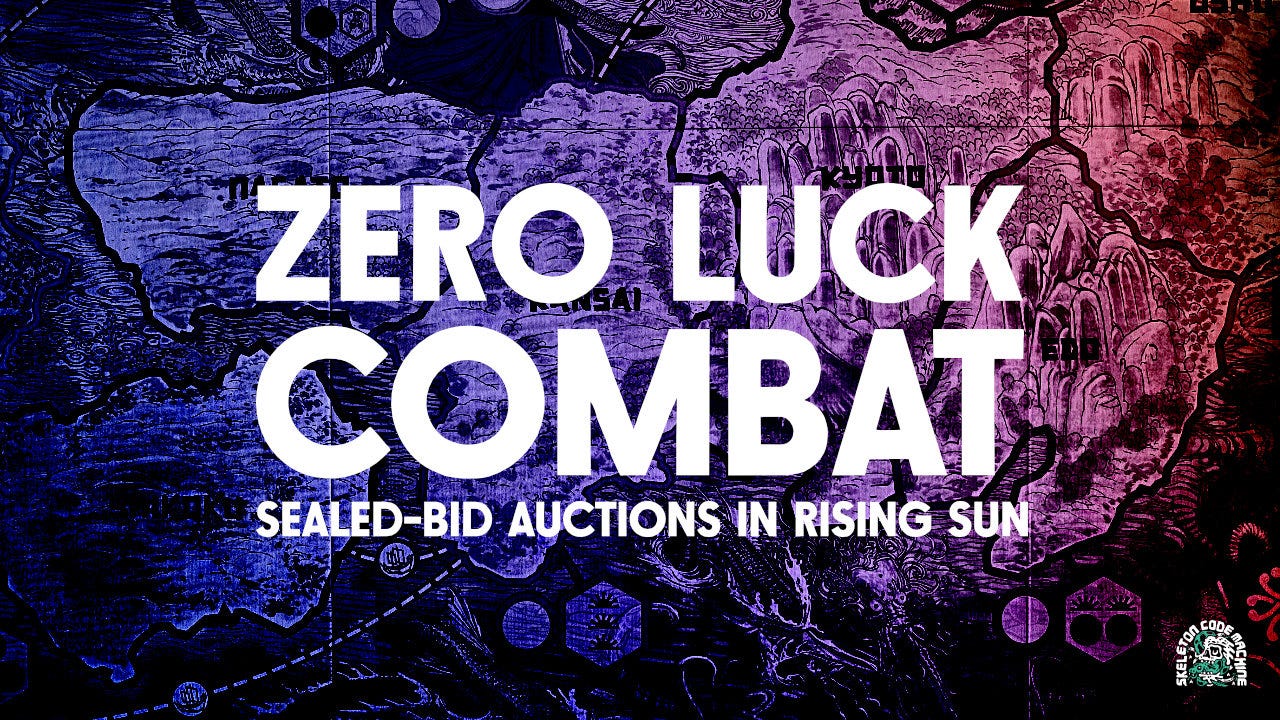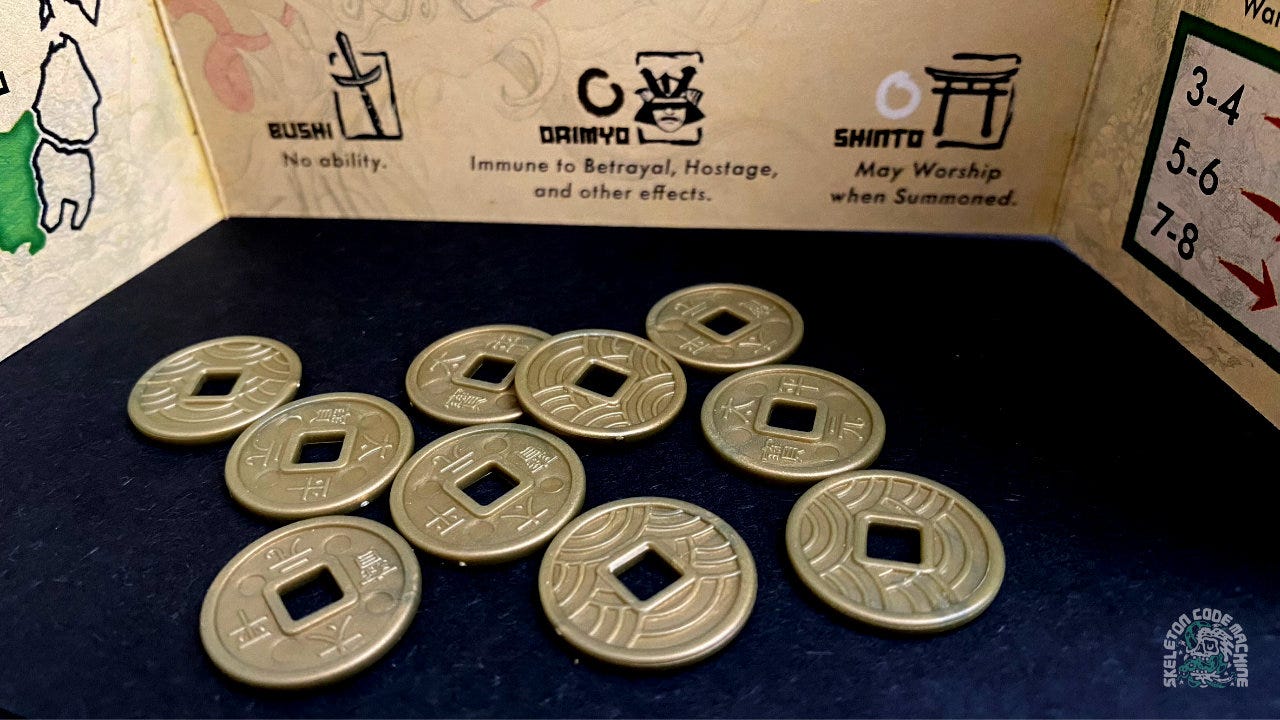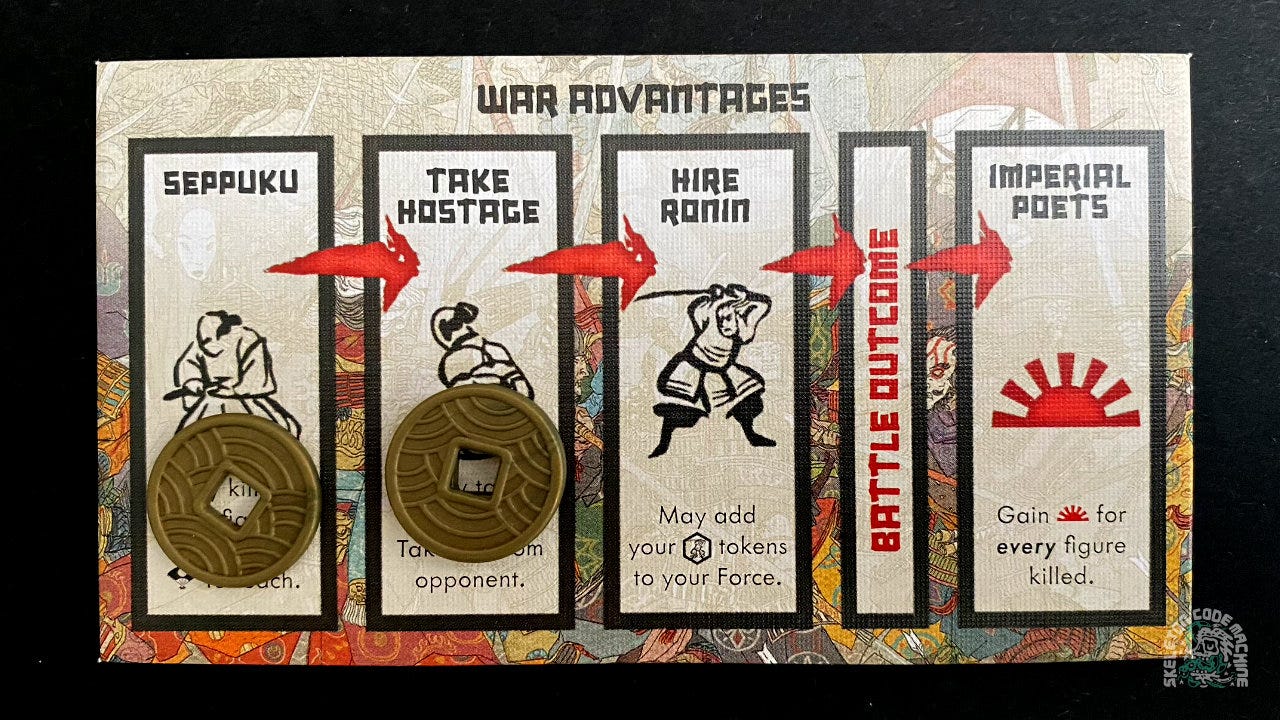Last week we looked at 10 Hex Kit Tile Packs. This week we are looking at an interesting combat resolution mechanism in Eric Lang’s Rising Sun!
Rising Sun
Rising Sun (2018) is one of my Top 10 Board Games:
Rising Sun is a board game for 3 to 5 players set in legendary feudal Japan. Each player chooses a Clan and competes to lead theirs to victory by accumulating Victory Points over the course of the Seasons. Each Clan possesses a unique ability and differs in Seasonal Income, Starting Honor Rank, and Home Province.
It’s part of the Eric Lang’s trilogy including Blood Rage, Rising Sun, and Ankh: Gods of Egypt. Produced by CMON, it has an impressive table presence with gorgeous minis, colorful board, and thick plastic action tiles that just feel so nice.
Five years after its release, it has dropped a little for me compared to the others in the trilogy.
Tim Chuon has some interesting thoughts in his Reviewing Rising Sun 3 Years Later video that I think are worth watching. The criticism of the Tea Ceremony phase of the game is something I’ve thought about quite a bit. I’ve played games of Rising Sun where someone felt left out after forming alliances, but I’ve also played games where it was a fun part of the game.
The combat in Rising Sun, however, has stayed fresh and exciting for me. It’s resolved via sealed-bid auction, and can involve quite a bit of bluffing.
Let’s take a look!
Sealed-bid auction mechanisms
First, let’s talk about Sealed-Bid Auctions (also known as Blind-Bidding) as a tabletop game mechanism.
Here’s how BGG describes it:
Players secretly make a bid. All bids are revealed simultaneously, and the high bidder wins. Typically some tie breaker mechanism is required. Common ones include closest to start player or using a secondary currency for a tie-breaking bid. A variation on this is called Sealed Bid with Cancellation. In this case, if two or more players have the same high bid, they are eliminated from contention.
Unlike an English Auction (i.e. the kind you usually see in movies) or a Turn Order Until Pass Auction, the Sealed-Bid Auction can be resolved quickly. Everyone places their bid behind a screen or in a closed fist, and everyone reveals at the same time. Done properly, this can add some dramatic moments to a game!
Perhaps because of this speed and simplicity, this style auction is used in many games.
Modern Art uses sealed-bids as one of the auction types, fitting both mechanically and thematically as an art auction. QE (which currently resides on my Shelf of Shame) also uses sealed-bids, but with no upper limit to how much you may bid!
The war phase
Rising Sun is played over the course of four “seasons,” each with the following phases:
Seasonal Setup
Tea Ceremony
Political Phase
War Phase
Seasonal Cleanup
As part of the Seasonal Setup, the War Province and War Number tokens are randomized so that the order of combat will change each season. It might make sense to intentionally lose an early battle in one province to better position yourself for a later one in a different province.
During the War Phase, players flip their player board to the War Advantages side. Then for each province with at least two non-allied clans, a battle will take place.
Players secretly allocate their coins to four available choices hidden behind their screens:
Seppuku: Kill all of their figures in the Province, gaining 1 Victory Point and one Honor for each one. This can be a way to position yourself higher on the Honor Track for later battles.
Take Hostage: Capture another player’s figure, only to be returned during the next season. You may also steal one Victory Point.
Hire Ronin: Adding coins increases your forces by +1 for each coin, strengthening your position in that province.
Imperial Poets: After the battle outcome, the player with the most coins on Imperial Poets gains Victory Points related to the total number of all figures killed in the battle.
The interesting part is that only the player who wins the War Advantage (i.e. bid the most) may perform that action. Ties are broken by being higher on the Honor Track.
One other key element is that while the losing players discard allocated coins from their War Advantages tile, the winning player must give all the coins they allocated to the losing players (dividing equally)!
With battles progressing through perhaps six to seven provinces, this provides some interesting choices for the players: Do you bid high early, to ensure you win key provinces? Do you intentionally lose some early provinces to gain coins for later battles? Do you try to increase your Honor to win ties, or rely on having coins so you prevent ties?
This creates a combat system that is entirely deterministic and not based on luck. There is always inherent tension, however, because you need to try to predict what other players are going to do each time.
Critically, you know how many coins each player had at the start of the War Phase, but not how they might allocate them each time. This provides enough information to make informed decisions, but not enough to know the outcome ahead of time.
I love rolling dice for combat as much as the next person (e.g. Root, BattleTech, For What Remains), but this combat style has really left an impression on me. It was my first exposure to sealed-bid combat system, and it is still my favorite part of Rising Sun.
Other games using auctions for combat
It’s worth noting that Rising Sun is not the first or only board game to use sealed-bid auctions to resolve combat. Geoff Engelstein gives some examples in Building Blocks of Game Design (p. 366):
Sealed-Bid Auctions are often used for combat resolution. In both Dune and Tiny Epic Kingdoms, players bid military strength, which might be further modified by other effects, to determine the victor of a military encounter. Scythe offers a similar auction, but players bid a resource to power their mechs rather than bidding actual troops.
The Dune (referenced above) is from 1979 (i.e. 44 years ago), so it’s definitely a long-used mechanism in board games. Bidding also shows up in a few TTRPGs like the chases in James Bond 007.
What’s interesting to me is that while I played Scythe (2016) well before I played Rising Sun (2018), it never really struck me as sealed-bid auction combat. Geoff is absolutely correct that it is, but I just never thought of it that way. When I played Rising Sun, however, it really felt like wagering and bidding.
As I mentioned in Top 10 Tips for Aspiring Board Game Designers, Geoff’s book is an absolutely must-have resource for designers! Go get a copy!
Conclusion
Some things to think about:
Sealed-bid auctions can be a fast mechanical option. As opposed to other styles of auction mechanisms, sealed-bids are quickly resolved. In addition, the act of everyone revealing their bid at the same time can add some theatrical fun to a game.
Having enough pre-bid information is critical. Sealed-bid or blind-bids can be fun, but not if the players have no information on which to base their wagers. The fun arises when the players are making well-informed and yet not fully certain decisions. Balancing information vs. risk is a key design challenge.
Auctions might be difficult to thematically integrate into a game. Especially in the case of TTRPGs, conducting an auction might pull the players out of the world of the game and seem too mechanical at times. That said, I’m sure there are interesting ways to build them into many games.
What do you think of combat in Rising Sun vs. the other Eric Lang games like Blood Rage and Ankh? Have you seen bidding used in interesting ways in TTRPGs?
Skeleton Code Machine is a production of Exeunt Press. If you want to see what else is happening at Exeunt Press, check out the Exeunt Omnes newsletter.
See you next week!
— E.P. 💀











As soon as you described this mechanism, I thought of Scythe (which I love). I like how you can move the odds in your favor by bringing more units to a battle, allowing you to use more battle cards and increase your possible maximum bid. I think the fact that battle is a fairly minor part of that game might explain your experience with it. I’ve played plenty of games where there are only one or two battles over a 2-hour game.